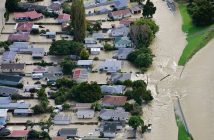Water quality and availability, rapid urbanisation, and the impact of natural hazards and climate change are the top three planning issues affecting New Zealand in 2018 and beyond, according to the New Zealand Planning Institute (NZPI)

These challenges will be among those addressed at NZPI’s annual conference Breaking New Ground held in Tauranga from 21 to 23 March 2018.
Agri-food disruption, housing supply, biodiversity offsetting, new technologies and reviewing the implications of the National Policy Statement on Urban Development Capacity are also on the agenda.
Speakers at the conference include international planning expert David Dixon, global head of Agribusiness Ian Proudfoot, Victoria Planning Authority CEO Stuart Moseley, renowned researcher Richie Poulton and US neighbourhood crowdfunding platform founder Erin Barnes.
NZPI Chair Bryce Julyan says planning and resource management within New Zealand is continuously evolving, and the role of planners and resource management specialists is to look forward and help plan for these issues.
“While issues like water, climate change and rapid urbanisation are more pronounced than they were a decade ago, these are global concerns and New Zealand planners must engage with others to examine our priorities in terms of the UN’s Sustainable Development Goals.”
Water quality and access to water resources is fast becoming a major issue globally.
“New Zealand is faced with the challenge of weighing up the need for protecting the environmental quality of our water resource while also allowing for the use of water for economic, social and cultural reasons – we must do this sustainably to ensure the resource is available for future generations,” adds Julyan.
Population pressure
Delegates at the conference will debate the effects of a growing population on our urban centres.
“We will discuss ways to better plan for the supply of housing, transport and other infrastructure. We must consider different models and forms, and innovation in our plans to futureproof our cities and ensure access to quality services and equity across social networks and community facilities.
“Planning for the long-term sustainable future of our cities and resources requires immediate attention.”
This year’s conference will tap into the considerable learnings of international speakers who will share their insights and best-practice approaches to key issues.
“Attendees have the opportunity to interact with presenters and establish relationships that may assist in developing skills and capabilities, as well as to observe and interact with technology initiatives that address a number of these key issues,” adds Julyan.
Held annually since 1964, the NZPI’s 2018 conference will be attended by more than 500 delegates including industry leaders, iwi, resource management experts, urban designers, scientists, environmental advocates, and local and central government representatives.



